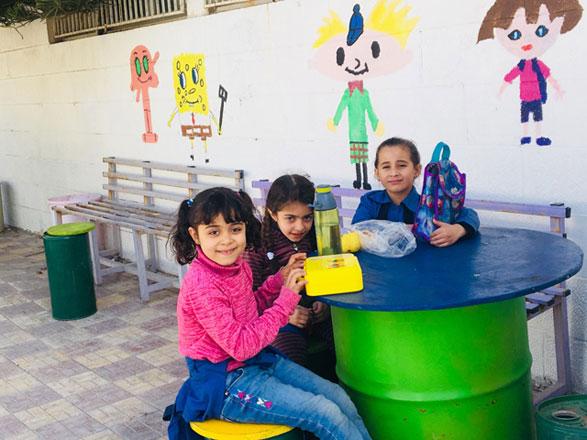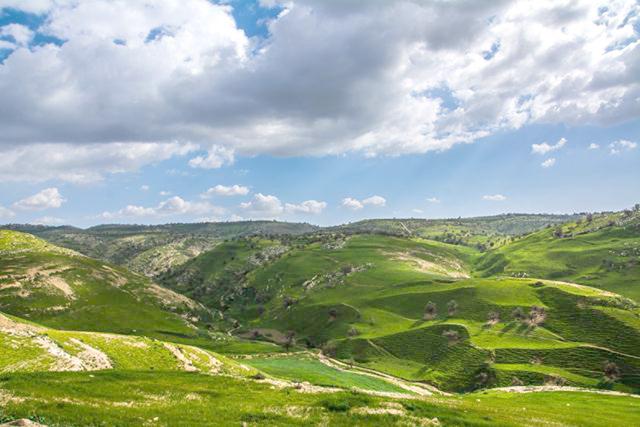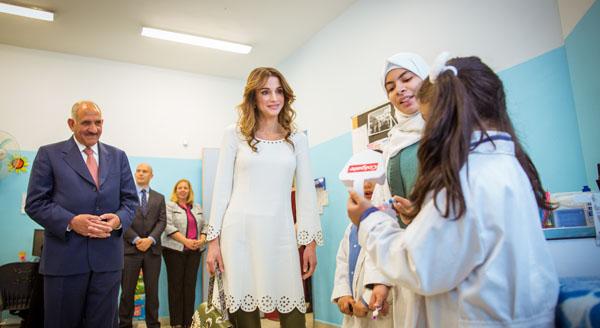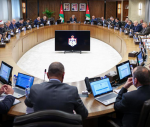You are here
Public school students learn responsible recycling through play, art competitions
By Camille Dupire - Apr 26,2018 - Last updated at Apr 26,2018
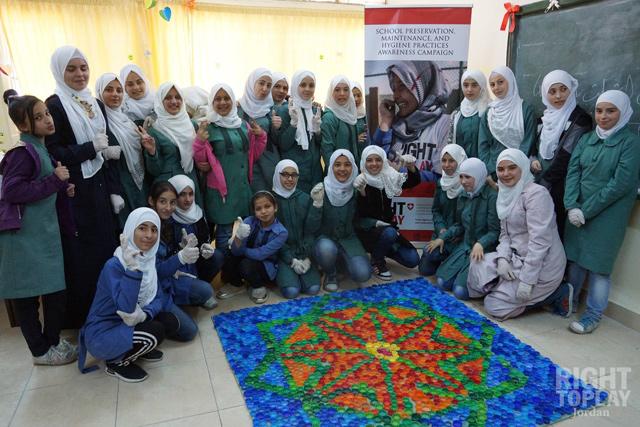
Students take part in an art competition aimed at preserving the school’s environment and beautifying their classroom in Amman recently (Photo courtesy of Right To Play Jordan)
AMMAN — Children from public schools are acquiring the responsibility of recycling and self hygiene through the “School Preservation, Maintenance and Hygiene Practices Awareness Campaign,” a nationwide project implemented by the Canadian organisation Right To Play (RTP) in partnership with the Swiss Agency for Development and Cooperation.
Launched in Amman’s girls schools Abu Alanda and Al Manara, and two Jerash boys schools in September 2017, the project uses entertaining games and art competitions to sensitise young children and their entourage to the importance of recycling and environment protection.
“No child ever becomes responsible for his/her environment by being lectured by a higher authority; instead, they need to take realisation of the benefits such behaviours can create for them, and gain a personal motivation for developing such practices,” RTP Jordan project officer, Odai Zobaidi told The Jordan Times.
The project recently began alongside RTP’s existing programmes aimed at educating and empowering local communities through sports and play to overcome the effects of poverty and conflict in disadvantaged communities, according to Zobaidi who stressed “we believe that the power of play can transform a child’s life. We provide students with the tools they need to protect themselves from disease, encouraging them to resolve the issues they face with tools that are easily accessible and can make a difference in their life.”
“We noticed that, despite previous efforts to rehabilitate classrooms to enhance the students’ well-being and learning environment, schools continue to grapple with vandalism and deterioration of infrastructure due to poor social cohesion and a weak sense of ownership and belonging,” Zobaidi explained, underscoring the need to develop children’s responsible sense of ownership through play-based school management activities, student awareness sessions and student-led initiatives.
RTP has been working with principals, teachers and students’ parliament to help them identify the most pressing issues in their schools before submitting proposals for a positive change they wish to see in their local area. Requests included need for clean drinking water taps at schools, outdoor playing areas and shaded outdoor learning spaces.
“We focus on initiatives that incorporate wash concepts, maintenance, up-cycling, health and beautification activities,” Zobaidi said, noting that RTP has launched various competitions to enhance students’ involvement in the project.
“We challenge students to maintain the cleanest classrooms and enter up-cycling art competitions, which is a great way to let them see how useful and beautiful recycling can be,” he continued, recalling children’s pride and amazement at their creations made out of plastic bottles’ caps.
Suzan Daraiseh, a teacher at one of the schools, expressed her appreciation for the project, saying “Right To Play helped us understand that teaching and learning could be fun. I feel really lucky to have the opportunity to join the project and learn new methods in teaching.”
Another teacher, Aisha Al Afagani commented: “Our journey and adventure together gave us great joy as we found entertaining ways to acquire many concepts that were unknown to us. We learned how to take advantage of simple things and turn them into creative works of art,” voicing her hope to see the project sustain throug the years.
Focusing on public schools in governorates that are highly populated with Syrian refugees, the project is scheduled to expand to schools in Amman, Jerash, Irbid and Zarqa.
Related Articles
AMMAN — With the aim of building a school environment characterised by beauty, discipline, health and hygiene, a new initiative has be
AMMAN — Heeding the global calls for conserving the environment, a group of Jordanians and foreign residents in the Kingdom have joined the
Her Majesty Queen Rania on Tuesday launched the Early Grade Reading and Math Project (RAMP) at the Dahiet Al Ameer Hassan Elementary Coeducational School in Amman.


